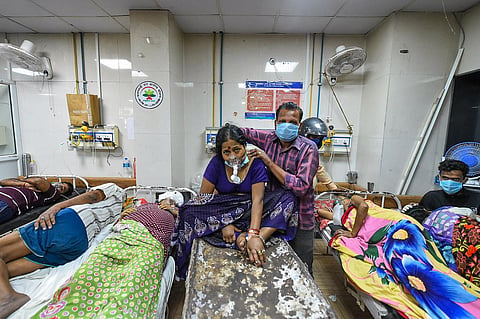

When times are normal, the quality of leadership is not on trial; even an unimaginative head of a country, an organisation, a family can get by. The situation changes when a threat looms large. Covid created such a situation in India, and the record shows that it was handled in a manner no one can be proud of.
To a large extent, the situation was handled from a standpoint not of public good but of public relations. The result was that the people did not quite know what was happening and what were the consequences of what was happening. Our parliamentary system does not enable the opposition to ferret out facts which the ruling dispensation tries to hide. And our media is “cautious”.
But observers from beyond our shores have been able to see what citizens could not. What they saw was not exactly encouraging. In fact, they were scary. Lancet, a highly respected and peer-reviewed medical weekly, commented: “Scenes of suffering in India are hard to comprehend.” Referring to the authorities ignoring repeated warnings of the dangers of a second wave, it said the “Government seemed more intent on removing criticism on Twitter than trying to control the pandemic. Government policies changed abruptly and without explanation creating mass confusion.”
Lancet, of course, had done its homework before coming out with its conclusions. Saying that governmental neglect was the main reason for the crisis going virtually out of control, the journal called it “a self-inflicted national catastrophe”. It explained: “The Government squandered its early success in controlling Covid. Its task force did not meet for months.” The journal faulted the Government for not “providing responsible leadership or transparency”.
These are serious charges based on serious fact-checking. Indian media is unused to - and also ill-equipped - to carry out studies of this kind. If anyone tried, he would run into trouble. The Government pays no attention to public opinion as can be seen from its hurried destruction of New Delhi’s Central Vista for the sole purpose of boosting the ego of individuals. This attitude of the Government could be a factor that makes foreign observers come out with dire predictions.
The Institute of Health Metrics, a global health research centre at the University of Washington, warned a few weeks ago that one million people could die in India by August because of Covid. Not one Indian would want to believe that. But the fact remains that, even if something like that were to happen, we wouldn’t know. In other words, we wouldn’t know until some study centre in Washington or London informs us.
Available information is discouraging. Rakesh Mishra of Covid-2 Genome Sequencing Consortium said experts had warned in early March that “there is a real danger” of a second wave. But the Government not only missed the point; health minister Harsh Vardhan publicly claimed that all was under control. In any case, the Government was busy with election politics in Bengal. The Prime Minister was focused on that, if his speeches of the time were anything to go by. Today, reports say, India accounts for half of the world’s new infections.
Does that matter? The Central Government does not seem to think so. Its priority is very clear, if we take even a cursory look at photographs coming from Delhi. The majestic Rajpath going from Rashtrapati Bhavan to India Gate and on the National Stadium already has its side lawns dug up with earth movers. The Central Vista is being given a new Modi Vista look. Plans for things like a new Prime Minister’s Residence will be pursued as high priority --- Covid or no Covid and whether or not hospitals have enough oxygen. (The PM’s Residence, please note, will have 10 four-storey buildings.)
News agencies say that Delhi is under “complete lockdown”. But the Modi Central Vista Project is going on as it has been termed “essential service”. No wonder a Washington newspaper ran a story headlined: “Modi’s pandemic choice: Protect his image or protect India. He chose himself.” That explains why American surveys report Modi’s approval ratings falling to a new low.
We are a nation with an eventful past. We have been ruled — and shaped? — by grand personalities, from Ashoka to Alauddin Khilji, from Aurangzeb to Akbar. India survived them all. That does not mean that India will survive whoever rules it. Aurangzeb did not have video call facilities. Nor did Akbar run a Jan-ki-baat programme. The game is different today. So are the players. These are days that put substance in the saying: Winner takes all.
ALSO WATCH: